It’s easy to build a real estate website, but optimizing it for conversions is a different story. It takes hard work, persistence, and patience to create a funnel that helps you convert random users into qualified leads.
While real estate agents and brokers can learn conversion optimizations by A/B testing different website elements, you can implement a few tried-and-tested strategies right away. They are proven to help you get more leads from your website.
In this guide, I am going to share some of these strategies and also some tips on how to minimize the time and effort that conversion optimization usually takes. I will share the 9 types of pages your real estate website must have and how to turn each one into a conversion machine. I guess some examples will help you understand my points more clearly, so you will find lots of them in this guide.
Table of Contents
Real estate website home page & how to make it conversion-friendly
Needless to say, the home page is the most important page of your website.
Your website visitors must be able to understand your unique selling proposition as soon as they land on the home page. It means it should clearly explain why you stand out from other Realtors in your target communities and what makes you the best Realtor to hire.
When you sell a home, the first impression for prospective buyers is the curb appeal, right? it will pique their interest. Even random buyers – scouting the neighborhood for homes listed for sale with a big yard sign – will want to enter the property if the curb appeal is good.
Treat the home page as your website’s curb appeal. This will act as an invitation for random visitors to check out other parts of your website and engage with you if they are impressed with what they find on the home page.
A home page usually has the following sections:
- Top Banner
- Navigation
- A home search bar
- A brief bio and short description of your real estate business (this links to the About page)
- Pics of your team members (this links to respective agent page)
- Featured listings (fetched by IDX or property listings plugin)
- Featured communities (links to relevant community page)
- Client testimonials (and other social proof. This links to testimonial page)
- Recently sold listings
- Links to buyer and seller resources
- ‘Featured mentions’
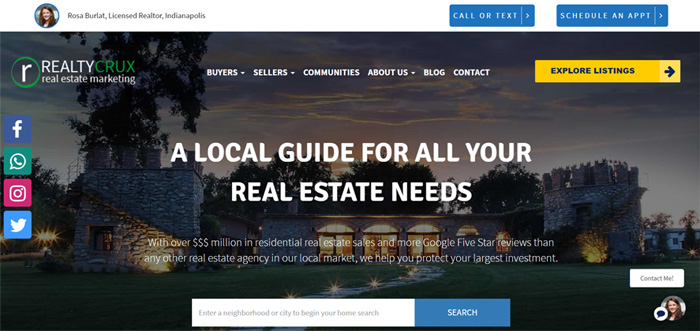
Here are a few components your home page must have in order to hook the visitors:
- Social proof or in the banner – Social proof can be anything – the number of clients you have served, the number of reviews you have received, the aggregated value of the real estate you have sold, etc. I recently wrote an article on how social proof works for real estate. Be sure to check it out.
- Easy-to-understand navigation – the visitors should find the navigation intuitive. It shouldn’t take them more than 2-3 clicks to find what they are looking for – be it community-specific listings or a home valuation landing page.
- Keep the search bar very simple and easy to use on the home page. The users shouldn’t need to provide more than a zip code or area name to search for homes. If you want your users to filter by other search criteria such as property type, minimum and maximum price, lease type, and the number of bedrooms and bathrooms, you can have an advanced property search page. Provide a link to this page in the navigation.
- In the bio and description, you must use professional pics of yourself and your office.
- In the featured listing section, you should display a maximum of 5-10 listings that you believe will resonate with your target audience. For example, if your specialty is luxury properties, you shouldn’t display budget homes in this section.
- Client testimonials are a must-have component of a real estate website home page. You can make them look authentic by showcasing the reviews you received on third-party platforms such as Google My Business, Zillow, Facebook, and Yelp.
- A ‘Just Sold’ section on the home page acts as a powerful social proof indirectly.
- You can also promote free real estate guides on the home page. Create a ‘Resources’ section on the home page that links to these guides.
- If you have been mentioned in popular magazines and newspapers, there should be a section on the home page to highlight this.
Consistent branding, color schemes, and a visually appealing logo are also important components of a home page. Don’t clutter it with too much information. Explain everything in brief and link each section to the relevant page in case users want more information.
Optimizing real estate ‘About’ and ‘Agent’ pages for conversions
The ‘About’ page is where you describe your real estate experience, USP, your certification, and other details to help users understand why they should work with you.

This page should have:
- Your detailed bio
- A brief bio of your team members (links to individual agent pages)
- Your certifications
- Your specialties (buyer’s agent, seller’s agent, luxury real estate agent, etc.)
- Mission statement and goals
- An explainer video that showcases what your firm is all about to help build your credibility and exhibit your personality.
- The combined experience of your team
- The sales volume in terms of value or aggregated number of properties sold
- Any unique selling proposition (USP)
- A lead capture form (such as Sing-up for Weekly Newsletter)
- Testimonials
- ‘As Mentioned In’ section
- a simple, straightforward CTA like “Learn More” or “Chat with One of Our Agents.”
Advanced property search/IDX page optimization
The users may want to filter the property search by different search criteria such as property type (single-family, condo, multifamily, etc.), their budget (max and min price), and requirements (max and min bedrooms/bathrooms).
Your website should have an advanced property listing page to help users find a home that suits their budget and requirements.
You can optimize this page for conversion by adding:
- a featured listing widget
- social proof
- CTA buttons
- A lead capture form
Community pages optimization for leads
Community pages will boost SEO and lead engagement, so they are a must for your website.
They are useful for both buyers and sellers, so provide as many details about each community as possible.
A community page should contain detailed information about the local real estate market (median listing price, average home value, etc.), popular neighborhoods or projects, schools, amenities, events, and local businesses.
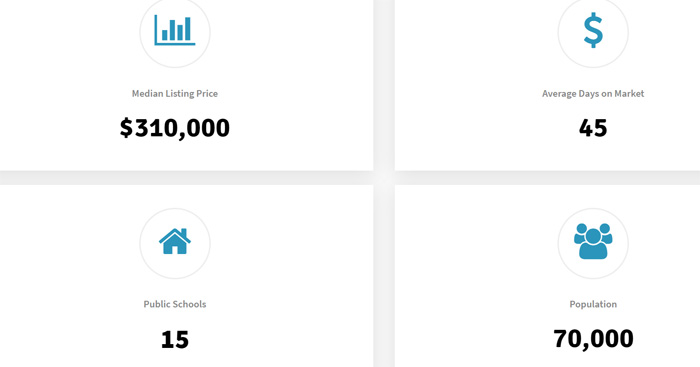
In a recent article, I explained with examples how to create perfect community pages for your real estate website. Be sure to check it out.
Real estate ‘Blog’ page optimization
Regularly updating your website with articles, guides and your commentary on the latest real estate market news and trends offers many benefits:
- You will have plenty of content to send out to your email subscribers
- You can turn your blog posts into a very powerful lead conversion component. For example, you can ask your visitors to sign up for weekly newsletter with real estate tips and market news.
- You can use CTA buttons and lead capture forms in the middle of the content.
- The biggest advantage is that you will optimize your site for increased search engine visibility. Your website will start ranking for your target keywords in Google and other search engines. This will get you free traffic. Make sure to read this article to learn how to make your real estate blog posts SEO-friendly.
- You can repurpose the content and turn them into eBooks. Free Books are a very effective lead magnet, meaning that you can offer them to users in exchange for their contact details.
- You will have more content to share on social media platforms such as Facebook.
- You can use this section to grow your network. Feature local businesses and professionals and publish their interviews.
- This will help you build credibility with prospective leads and establish yourself as a local real estate market expert.
To make this page conversion-friendly, make sure to write highly relevant and fresh content that provides value to readers. There are plenty of websites to provide generic real estate advice. Figure out a way to make your articles stand out from other blog posts and guides already available everywhere on the internet.
How to make real estate ‘Resources’ page conversion-friendly
‘Resources’ page serves as a home to cornerstone content on your real estate website.
You can showcase the most detailed guides on buying or selling real estate on this page.
You can turn these guides into downloadable eBooks and offer these to prospective leads in exchange for their contact details.
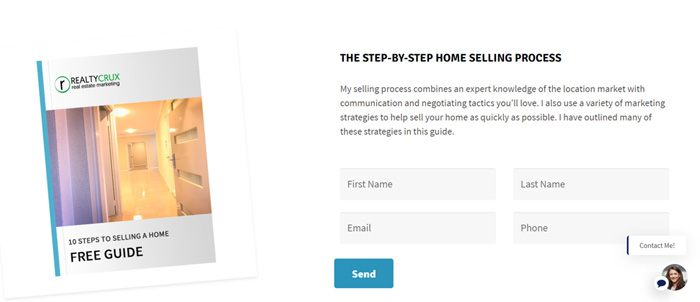
These guides can contain:
- Data-rich real estate market reports
- Infographics
- Detailed information about the community
- Videos
Those who download these resources can be targeted with custom Thank You pages that ask the leads to get in touch with you for more information.
Optimizing ‘Free Home Valuation’ page
Home valuation landing page is an indispensable part of a real estate website, and for good reasons.
Sellers need to know how much money they can potentially get for their properties. By offering prospective sellers an accurate estimate of their home, you will be able to start a relationship with them in the initial stage of their real estate journey.
You can stand out from popular tools such as Zestimate by offering a personalized free home valuation that is more accurate than these tools.
Explain how you will use your local real estate experience to get them the best estimate of what their property is worth.
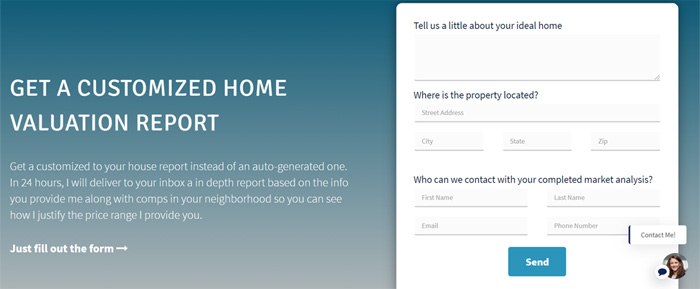
Once they share their contact details to get a free home valuation report, you can retarget these leads with drip email campaigns, PPC campaigns, and social media marketing. Also, you can simply call/text them to learn more about their real estate needs.
In a recent article, I discussed how to create a home valuation landing page for seller leads. Be sure to check it out.
‘Free Consultation’ page
The chances of converting a lead into a client will increase substantially if you can make a sales pitch face-to-face or on the phone, right? That’s why so many Realtors offer a free consultation.
It’s a very popular lead conversion tactic, and it calls for a dedicated page on your website.
This page will contain a simple contact form or a calendar for visitors to set up an appointment.
It should also contain everything that encourages the user to take the desired action (that is to set up the appointment in this case).
The following elements will help you increase the conversion rate on this page:
- You should consider using a schedular instead of a form. Calendly is a free scheduling platform.
- Your professional photograph.
- Testimonials
- Explain what the lead should expect from the consultation and what value you will bring to the table.
Testimonial and ‘social proof’ page
There are many different types of testimonials:
- Quotes from your real estate clients
- Video testimonials
- Press mentions
- Case studies
- Social media reviews and testimonials
- Statistics that prove your expertise, knowledge and experience
- Participation in community events
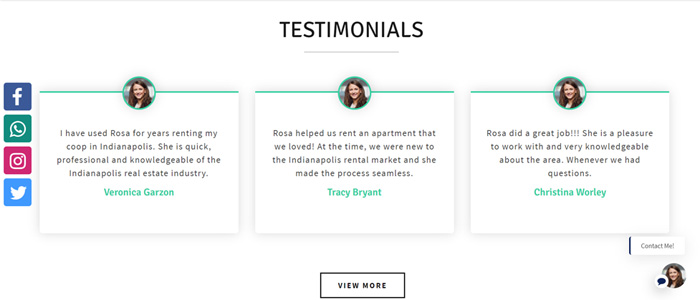
The testimonial page should serve its purpose of building your authority. You can use reviews that you received on your social media accounts and third-party websites such as Zillow and Realtor.com on your own website.
In a recent article, I explained how social proof works for real estate agents.
In conclusion
Strategically placed CTAs, use of social proof wherever appropriate, simplified navigation, and mobile responsiveness are some of the features you real estate website must have. These features will help you improve the conversion rate and turn random website visitors into paying clients.
![Complete Guide to Creating Home Valuation Landing Page [Examples Included]](https://realtycrux.com/wp-content/uploads/2021/03/whats-home-worth-landing-page-xxl22s-300x138.jpg)
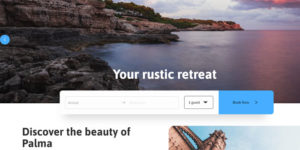
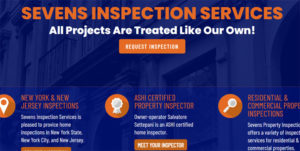
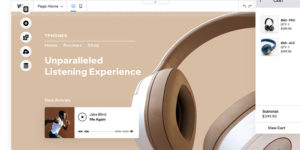
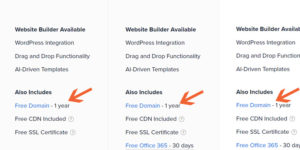
![How to Create Real estate Community Pages that Convert Like Crazy [Examples]](https://realtycrux.com/wp-content/uploads/2021/06/community-pages-guidelines-for-realtors-xl2l2-300x158.jpg)